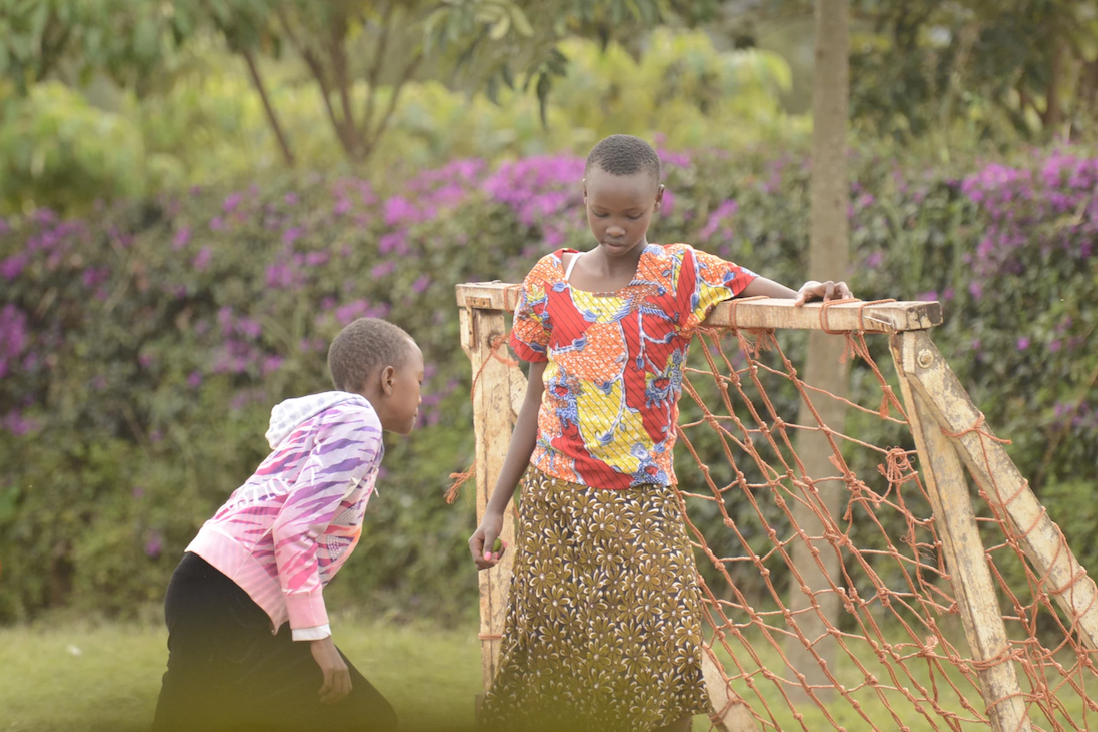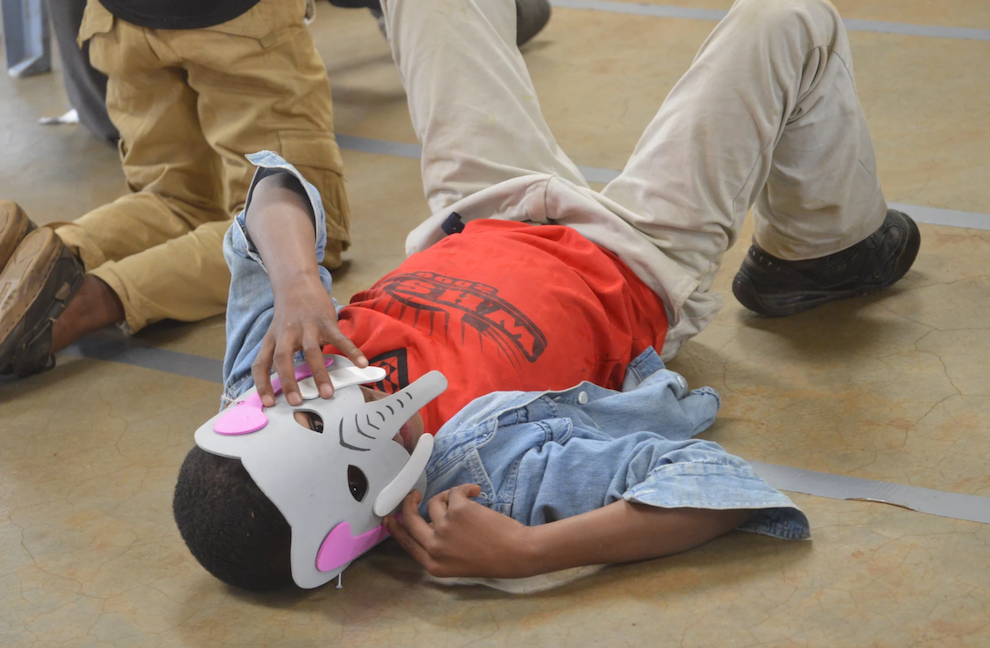A few summers ago, my father and I lived briefly at the Rift Valley Children’s Village in Tanzania’s Karatu District. India Howell, an American woman, and Peter Leon Mmassy, a Tanzanian man, founded the Children’s Village in 2004 as a permanent home for orphaned and other marginalized children. Tanzanian law requires non-citizens to live in the country for three consecutive years before adopting, essentially prohibiting international adoption, but the law is not the reason these children belong at RVCV. Howell and Mmassy have been clear that their children are not available for adoption—by foreigners or by Tanzanians. They are already loved.
Howell’s niece taught my fifth-grade history class, incorporating lessons on Kiswahili, one of Tanzania’s two official languages (the other being English), and on challenges facing children our age in East Africa. She showed us photographs from her time volunteering at RVCV. These photographs had an indescribably powerful pull for me—an attraction that was shared, in part, by nearly all of my classmates. She gave names and faces to children living in poverty; she narrated their stories to us. She assigned geography quizzes to teach us African country names, but she also managed to capture more profoundly the lives within these borders. And, because she talked about RVCV’s children just as she talked about us, she did not fall prey to the idea that an African child is a cause to be pitied. She understood that these children were, instead, our peers.
But there was a sense of injustice in her lessons, in the difference between these children’s lives and mine, that frustrated me. There was the stark contrast between the individual attention my classmates and I received from teachers like her and the often overcrowded classrooms of rural Tanzanian primary schools. Especially, there was the tacit understanding that the children at RVCV had lost one or both parents.
My friends and I attended our classmate’s father’s memorial service and shiva when he passed away that year. The same impulse to be present, in whatever way might be helpful, drew me to Tanzania. So I saved my money for eight years to pay the plane ticket price and, when I graduated from high school, I traveled to RVCV with my father to volunteer.
On the Road: Arusha to Oldeani
We were driven from Kilimanjaro, the small airport town near the city of Arusha where our flight landed, to the Children’s Village, situated on a coffee plantation close to the village of Oldeani. The car passed Mto wa Mbu, a town named for the Mosquito River; men and boys cutting grass with machetes; one mosque and several churches; Lake Manyara; wide, dry savanna littered with dark trees but lacking in people; Masai herders, traditionally clothed, traversing the land; bright white goats running over territory labeled military training ground; a boy in his teens practicing a military march in place. I supposed he had grown up sufficiently close to the soldiers to have felt their inspiration. My cousin, a historian since the age of four, has read about armies, and his fascination is intellectual. This boy had watched, and his engagement was physical.
Acrobatics
When we arrived at RVCV, Elibaraka was hanging from a tree limb. Impressed, we asked how he had shimmied up its trunk. Pleased, he demonstrated a series of gymnastics feats.
Before each, he asked, “Can you do this?”
After each, I answered, “Nope.”
Nearby Hills
Our walk was short. We only got as far as the little river in the adjacent valley. By the time we returned, just before lunch, Ema had skinned his knee, and Joanne was nursing a tiny cut on her finger with great concern. Halfway back up the hill to Campi Nairobi, the tiny village next to RVCV, Elibaraka lifted Boni onto his shoulders and carried him to the top. In exchange, Boni pulled a thorn out of Elibaraka’s shoe. With vigorous shaking and tapping, Gabi cleared out the other.
Story
At night, Ema rested his tiny body—already muscular at age five—against mine as I read the Mikumi House boys a picture book. The older ones hung about, half listening, half climbing across the bunkbeds. From one bed, Micha called to us to wait and kept calling until he could situate himself on my other side, the rest of his body under blanket. Children at bedtime, as I have known them, let their daytime personalities fade away and become almost vulnerable. They ask for pieces of coziness and intimacy, like a story.
Goat
In the evening, the Young Men (secondary school boys) played the Crater Giants (male staff) in soccer and won, moving forward in a tournament whose final prize was a goat for the team to cook. Because they considered the Crater Giants their only real challenge for the title, the boys were wild after the win. When they scored, women from Campi danced. When the ref blew the final whistle, the Young Men cheered and ran their long victory lap around the field. And, like a joyous comet, a crowd of kids from RVCV and Campi ran right behind.
* * *
As we watched, Micha asked me to pick him up—ostensibly to see the game better—and I did. I held him for some time. While the other boys were closely monitoring the soccer match, he was pointing out the three birds perched on nearby cables.

A View from the Crater
As beautiful as we found the Ngorongoro Crater—though a crater is by nature enclosed, it felt infinite—it could not match returning to Gericki’s hugs and words of pre-teen affection, even when he was mostly just trying to steal your hat. Or Coletha walking with Jacklina, working on balancing a basket on her head for the fun of it, in her case, as much as for its practicality. Or Juliana and Sharifa on the swings, eagerly anticipating tomorrow’s class and discussing who got to read Ramona’s part in our daily Beezus and Ramona read aloud. Or Edina grabbing your hand and later smiling shyly but so widely when you greet her. Or Rahim showing you eagerly how he can braid and how he can read. Or the boys asking you if “ass” is a bad word, quite seriously, because they must, in some way, respect you.
Rules of Chess
Lemomo is first in his class, Standard 1 (first grade, in the American system), at Gyetighi Primary School. After watching some of the other boys play chess, he asked to join. I gave him my place, so little Ema was his opponent. My explanation of the game’s rules was brief and perfunctory; I didn’t expect him to absorb much right away. The other boys—many of them years older—had taken far more coaching before they began to play independently, but Lemomo understood immediately. His only points of confusion were the rules I had failed to fully explain or the ones Ema sometimes muddled by playing wrong. Pretty soon, those boys needed me only to keep the toddlers’ hands away from the board. With shocking speed, they could play chess—at the age of five. At that age, I was just learning checkers.
Kiran
Gericki invited us to Kiran House for Sunday dinner. When I asked Ericki a question, he promptly replied, “Anything you want, sister!” He insisted that I come “check on” him before breakfast the next day. And I had to pinky promise him and Gericki and Lemomo that I would follow through or he would eat my thumb. He claims it tastes like peanut butter.
After dinner, I helped the older girls with the dishes. Riziki told me she wants to go to Harvard. Esther wants to be a teacher or an astronaut, Janet a lawyer, and Lucy a designer. Ericki wants to be a soccer player. But Gericki wants to be an accountant because “Ericki! Money doesn’t come from nowhere.”
Lighter Load
Rehema, one of our Standard 4 students, was the younger of a pair of sisters. Adopted at a young age, she carried complex emotions. The first to arrive to class one day, she picked up baby Jacobo and held him while we waited for the others. She was wearing a velvet dress, and I tied the ribbon in the back while the infant sat on her lap. She was particularly sweet in class that morning (her addition of a dot of blue to everyone else’s watercolor painting aside). She had never chosen to read out loud with the rest of the class. She hesitated, I think, to attempt any task she couldn’t be sure she’d be good at.
She was perceptive, though, whether or not she appeared to be paying attention. She leaned her head on me today, following along with my copy of the book. She let me stroke her back—in essence, she let me love her.

Father
Gericki was ten, or maybe 12; very few rural Tanzanians have birth certificates. He and his twin brother, Ericki, were in Standard 5, the equivalent of fifth grade, as a best-guess placement for their age. It had been a long time since he had had a father, longer since he had lost his biological mother.
Ericki and Gericki were exceptional children—hilarious, astute, generous. Their eyes possessed a constant light, knowing but not jaded. They had earned their innocence. They had seen horrors and had decided that their slight frames were a match for whatever life could hurl at them. This way of processing was likely not completely conscious; personality never entirely is. But their awareness of the world was remarkable, in anyone and certainly in ten- or twelve-year-olds. Gericki and Ericki’s love—for each other, for the significant adults in their lives—is intentional, intense, and powerful.
My father, who was volunteering with me, had brought a soccer ball for the kids’ playtime.
“Do you love your dad?” Gericki asked me as we walked to retrieve the ball.
“Yes,” I told him.
“Good,” he answered. “I love my dad, too, but I can’t see him anymore.”
“I know,” I said. “I’m sorry.”
They weren’t the right words, but, in that moment, they were the best I could muster. I hoped he could see from my eyes that I felt with greater depth than the ordinariness of my language suggested.
He said, “It’s okay. Death is part of life, too.” And then he took the soccer ball and was off, as easily playful as sage.
Images provided by Olivia Herrington/HPR.
